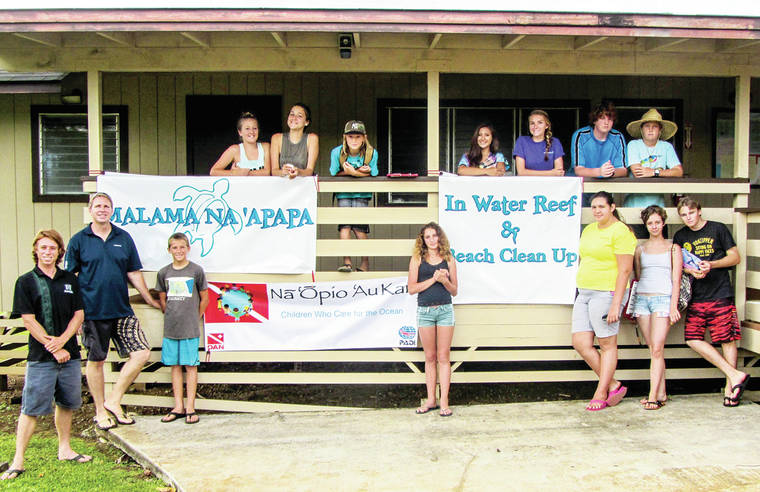KAPA‘A — Malama Na ‘Apapa’s focus on sustainability has become more critical to Kaua‘i’s community during the COVID-19 pandemic.
The nonprofit organization primarily focuses on marine-ecology education, community-outreach programs in schools, and surveys to collect data about the health of Kaua‘i’s reefs.
Before the pandemic, Malama Na ‘Apapa mainly focused on coastline debris-removal programs.
Malama Na ‘Apapa was awarded $200,000 in additional funding from the Coronavirus Aid, Relief, and Economic Security Act Grant.
The grant allowed them to grow their initiatives, according to MHA Director Scott Bacon.
“These efforts towards creating a more sustainable Kaua‘i have always been a major value to our nonprofit,” Bacon said. “This pandemic has been a good reminder to continue to take care of our local resources, especially the ocean.”
Adopting sustainable-fishing practices, lessening reliance on plastics and reducing waste are ways to help coral-reef ecosystems, and should be lifestyle moves, Bacon added.
The clean-up crew
The financing received from the CARES Act allowed the nonprofit to hire employees, including three full-time and 15 part-time workers who lost their jobs because of the COVID-19 pandemic, to work as scuba professionals.
The recently-hired staff performs tasks relevant to the nonprofit’s two main objectives: cleanup and data-collecting.
The divers remove fishing lines, nets, tarps and other highly-destructive items to the ocean’s ecosystem from reef environments.
Before the added financial resources, MNA ran mostly on volunteers.
“Funding from the County of Kaua‘i has allowed the MNA to employ individuals not only for the coastal and in-water debris removals but to begin extensive reef-monitoring surveys,” Bacon said.
“The information recorded from these surveys will serve as baseline data, displaying the overall health of each surveyed reef around the island.”
Enriching future generations (SUBHEAD)
Because of COVID-19 and social-distancing, the MNA has not been able to coordinate beach-cleanup efforts with students. Their educational-outreach program, Eyes of the Reef Training, hopes to provide debris-removal training to students in the interim.
“This program will prepare students before beach cleanups until they can participate again, and is aimed to help students identify coral species, coral bleaching and invasive species on the reef,” Bacon said.
“This will educate students on the negative impacts of the debris on a reef, where debris comes from, and methodology of weighing (and) sorting debris after cleanup.”
Because of the grant money, MNA doesn’t view the recent pandemic as a setback.
“The pandemic presented an opportunity to look at new employment routes for Kaua‘i residents and other ways to diversify the island’s economic sectors,” Bacon said. “One way to do this is to invest more in environmentally-focused jobs.”
•••
Jason Blasco, reporter, can be reached at 245-0437 or jblasco@thegardenisland.com.



So thankful for these funding sources to put Kauai people to work in jobs that support Kauai.
So who is the 3 full-time employees that will receive a large chunk of the fed grant?
The 15 will get the left overs.
This is just like the Kauai Independent Food Bank Fraud, Waste, and Abuse of Fed dollars.
Once the grant is dried up be sure to hire a good grant writer to keep up with the kardashians.